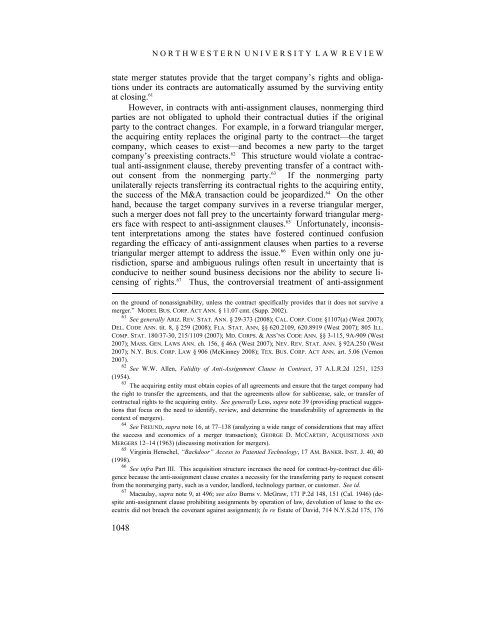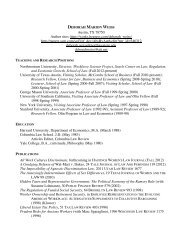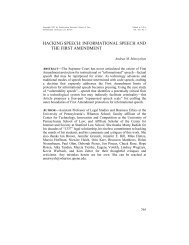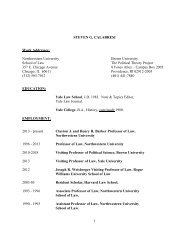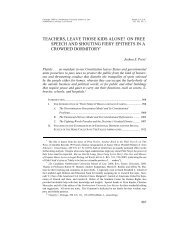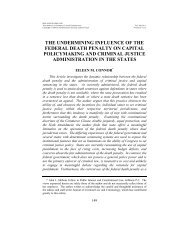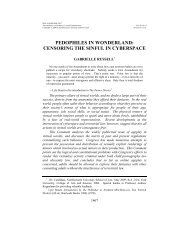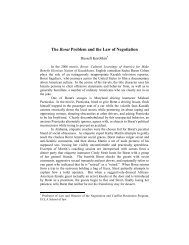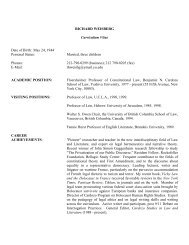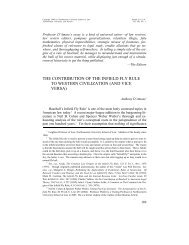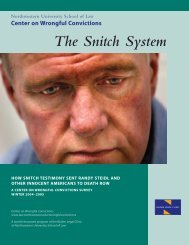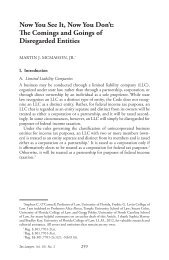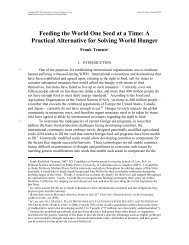The Reverse Triangular Merger Loophole and Enforcing Anti
The Reverse Triangular Merger Loophole and Enforcing Anti
The Reverse Triangular Merger Loophole and Enforcing Anti
Create successful ePaper yourself
Turn your PDF publications into a flip-book with our unique Google optimized e-Paper software.
1048<br />
N O R T H W E S T E R N U N I V E R S I T Y L A W R E V I E W<br />
state merger statutes provide that the target company’s rights <strong>and</strong> obligations<br />
under its contracts are automatically assumed by the surviving entity<br />
at closing. 61<br />
However, in contracts with anti-assignment clauses, nonmerging third<br />
parties are not obligated to uphold their contractual duties if the original<br />
party to the contract changes. For example, in a forward triangular merger,<br />
the acquiring entity replaces the original party to the contract—the target<br />
company, which ceases to exist—<strong>and</strong> becomes a new party to the target<br />
company’s preexisting contracts. 62 This structure would violate a contractual<br />
anti-assignment clause, thereby preventing transfer of a contract without<br />
consent from the nonmerging party. 63 If the nonmerging party<br />
unilaterally rejects transferring its contractual rights to the acquiring entity,<br />
the success of the M&A transaction could be jeopardized. 64 On the other<br />
h<strong>and</strong>, because the target company survives in a reverse triangular merger,<br />
such a merger does not fall prey to the uncertainty forward triangular mergers<br />
face with respect to anti-assignment clauses. 65 Unfortunately, inconsistent<br />
interpretations among the states have fostered continued confusion<br />
regarding the efficacy of anti-assignment clauses when parties to a reverse<br />
triangular merger attempt to address the issue. 66 Even within only one jurisdiction,<br />
sparse <strong>and</strong> ambiguous rulings often result in uncertainty that is<br />
conducive to neither sound business decisions nor the ability to secure licensing<br />
of rights. 67 Thus, the controversial treatment of anti-assignment<br />
on the ground of nonassignability, unless the contract specifically provides that it does not survive a<br />
merger.” MODEL BUS. CORP. ACT ANN. § 11.07 cmt. (Supp. 2002).<br />
61<br />
See generally ARIZ. REV. STAT. ANN. § 29-373 (2008); CAL. CORP. CODE §1107(a) (West 2007);<br />
DEL. CODE ANN. tit. 8, § 259 (2008); FLA. STAT. ANN, §§ 620.2109, 620.8919 (West 2007); 805 ILL.<br />
COMP. STAT. 180/37-30, 215/1109 (2007); MD. CORPS. & ASS’NS CODE ANN. §§ 3-115, 9A-909 (West<br />
2007); MASS. GEN. LAWS ANN. ch. 156, § 46A (West 2007); NEV. REV. STAT. ANN. § 92A.250 (West<br />
2007); N.Y. BUS. CORP. LAW § 906 (McKinney 2008); TEX. BUS. CORP. ACT ANN. art. 5.06 (Vernon<br />
2007).<br />
62<br />
See W.W. Allen, Validity of <strong>Anti</strong>-Assignment Clause in Contract, 37 A.L.R.2d 1251, 1253<br />
(1954).<br />
63<br />
<strong>The</strong> acquiring entity must obtain copies of all agreements <strong>and</strong> ensure that the target company had<br />
the right to transfer the agreements, <strong>and</strong> that the agreements allow for sublicense, sale, or transfer of<br />
contractual rights to the acquiring entity. See generally Less, supra note 39 (providing practical suggestions<br />
that focus on the need to identify, review, <strong>and</strong> determine the transferability of agreements in the<br />
context of mergers).<br />
64<br />
See FREUND, supra note 16, at 77–138 (analyzing a wide range of considerations that may affect<br />
the success <strong>and</strong> economics of a merger transaction); GEORGE D. MCCARTHY, ACQUISITIONS AND<br />
MERGERS 12–14 (1963) (discussing motivation for mergers).<br />
65<br />
Virginia Henschel, “Backdoor” Access to Patented Technology, 17 AM. BANKR. INST. J. 40, 40<br />
(1998).<br />
66<br />
See infra Part III. This acquisition structure increases the need for contract-by-contract due diligence<br />
because the anti-assignment clause creates a necessity for the transferring party to request consent<br />
from the nonmerging party, such as a vendor, l<strong>and</strong>lord, technology partner, or customer. See id.<br />
67<br />
Macaulay, supra note 9, at 496; see also Burns v. McGraw, 171 P.2d 148, 151 (Cal. 1946) (despite<br />
anti-assignment clause prohibiting assignments by operation of law, devolution of lease to the executrix<br />
did not breach the covenant against assignment); In re Estate of David, 714 N.Y.S.2d 175, 176


